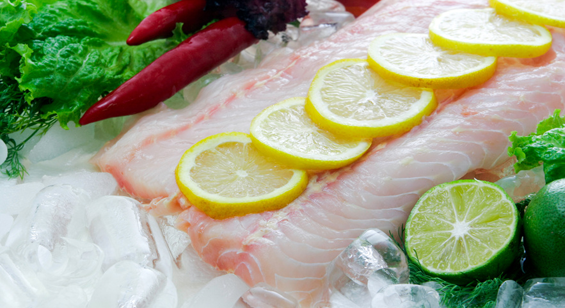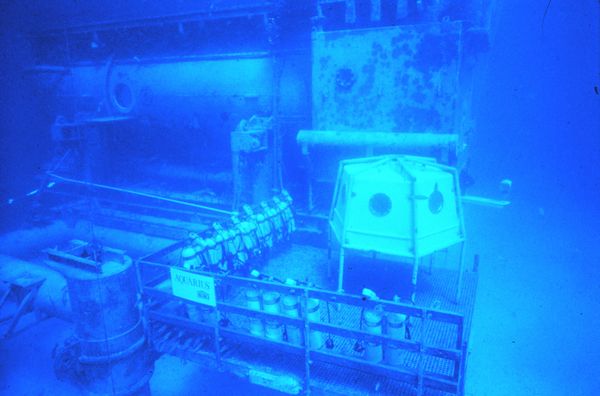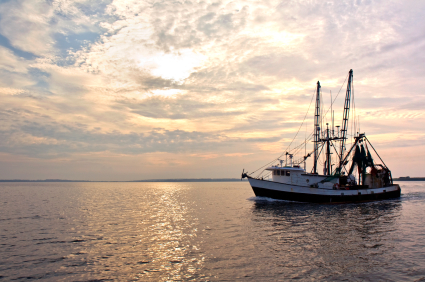Video: State of the Oceans Forum: A Call to Action
A Special ExpeditionCasts Presentation: State of the Oceans : A Call to Action. With its growing focus on conservation, the Explorers Club hosted its first-ever State of the Oceans Forum, featuring a panel of ocean explorers/scientists offering a range of perspectives on the state of our oceans today and the actions we must take in order to restore and sustain them. The panel was held on Sunday, March 22, 2009 at the Explorers Club’s World Center for Exploration in New York City. (You can watch this video below or on your iPod or compatible MP3/video player by subscribing free to ExpeditionCasts in iTunes.)
|
||||||||
|---|---|---|---|---|---|---|---|---|
 |
We need your input!
This unique Forum marked the beginning of an ongoing effort to develop an effective “Call to Action,” including priorities and actions. An initial draft was developed by panelists and presented during the forum for input. What do you think? Please take a moment to download the draft Call to Action and provide your input and ideas below in the comment section.
 |
 |
||
THE EXPLORERS CLUB ANNUAL DINNER WEEKEND
STATE OF THE OCEANS FORUM 3-5 PM, MARCH 22, 2009
The Explorers Club, 46 East 70th Street, New York City
Forum Chair, Dr. Susan Shaw, FN?07
Moderator, Dr. Sylvia Earle, MED?81
Lecture Series Chair, Anne Doubilet, FR?02
| The oceans are in crisis. As Explorers, we need to focus world attention on protecting this most crucial natural resource.
Sustaining 90% of Earth’s biodiversity, the ocean environment and its living inhabitants are being steadily destroyed by human activities. Overfishing and mega-trawling have depleted global fish stocks and ripped up the ocean floor. Ocean dumping, toxic runoff from land, plastic debris, oil spills, and carbon emissions have resulted in widespread loss of biodiversity. Large-scale alterations to ocean ecosystems have occurred and more are underway. We urgently need to prevent further ocean degradation and reverse the damage before it is too late. |
Download the Forum Program (PDF)
| PROGRAM: PANEL AND DISCUSSION
3:00-3:05 Excerpt from the Film Acid Oceans: A Sea Change by Barbara Ettinger 3:05-3:10 Introduction: Dr. Sylvia Earle 3:25 ? 3:40 Toxic Seas: Oceans as Sinks and Reservoirs of Pollution – Dr. Susan Shaw 3:55 ? 4:10 Living at the Edge of An Unfamiliar World -Dr. David Gallo 4:10 ? 4:25 Ocean Conservation/ Education – Dr. David Guggenheim 4:25 ? 4:55 Explorers Call To Action ? Dr. Sylvia Earle and Jim Fowler 4:55 ? 5:00 Closing Remarks: Dr. Sylvia Earle |
||||||||||||||||||||||||
PANEL SPEAKERS
Called “Her Deepness” by the New Yorker and the New York Times, “Living Legend” by the Library of Congress and “Hero for the Planet” by Time magazine, Sylvia Earle is a world-renowned oceanographer, explorer, author and lecturer who has been at the frontier of deep ocean exploration for four decades. She has led more than 70 expeditions involving more than 6,000 hours underwater, including leading the first team of women aquanauts during the Tektite Project in 1970 and setting the depth record for solo diving at 3,300 feet. Earle was former chief scientist of NOAA and has played a key role in establishing marine protected areas worldwide. She is president of Deep Search International and chair of the Advisory Council for the Harte Research Institute. She has a Ph.D. from Duke University and 15 honorary degrees. She has authored more than 175 publications, written many books, lectured in more than 60 countries, and appeared in hundreds of television productions. Earle has received more than 100 national and international awards including the 2009 TED Prize. She is the inspiration behind the new Ocean in Google Earth program.
Susan Shaw is a marine toxicologist, explorer, author, and ocean advocate who has spent two decades documenting the effects of hundreds of man-made toxic chemicals in marine mammals along the North American Pacific and Atlantic coasts. Described as ?a modern day Rachel Carson,? she has a passion for understanding large sea mammal wildlife sentinels and how their proximity to people has put them in peril. In 2007 the Maine Legislature honored Shaw for her pioneering work addressing the problem of ocean pollution and its impacts on marine life and humans. She is credited as the first scientist to discover that brominated flame retardant chemicals used in consumer products are bioaccumulating in marine mammals and commercially important marine fishes in the northwest Atlantic, a finding with implications for human health that has influenced legislation in the US and internationally. Named 2007 Gulf of Maine Visionary, Shaw is widely recognized for creating an extensive body of data that places the northwest Atlantic marine ecosystem in a global perspective. She holds an M.F.A. in Film and a Dr.P.H. in Public Health/ Environmental Health Sciences from Columbia University.
Nancy Knowlton’s research on the ecology, evolution and conservation of coral reef organisms has taken her to the Caribbean, the Central Pacific, the Indian Ocean, and the west coast of Africa. Her analyses have led to the now widespread recognition that estimates of marine diversity are probably too low by a factor of ten. Knowlton received her PhD at the University of California at Berkeley, and was a professor at Yale University prior to moving to the Smithsonian Tropical Research Institute in Panama. Later, she joined the Scripps Institution of Oceanography at the University of California at San Diego, where she became the founding Director of the Center for Marine Biodiversity and Conservation. She currently serves on the National Geographic Society’s Committee on Research and Exploration and the Conservation Trust Committee, chairs the World Bank’s Targeted Research Program for Coral Reefs, and is principle investigator of the Census of Marine Life’s Coral Reef Initiative. She is an elected fellow and member of the Board of Directors of the American Association for the Advancement of Science, and an Aldo Leopold Leadership Fellow.
David Gallo holds an M.Sc. degree in Geological Science from the State University of New York at Albany and a Ph.D. in Oceanography from the University of Rhode Island. In 1987 he was invited by Dr. Robert Ballard (discoverer of the wreck of RMS Titanic) to join his team at the Woods Hole Oceanographic Institution as the Assistant Director of the Center for Marine Exploration. One of the first oceanographers to use a combination of submarines and robots to map the undersea world, he has participated in numerous expeditions to the Atlantic, Pacific and Indian Oceans, and to the Mediterranean Sea. Gallo is passionate about exploration and discovery and dedicated to communicating the importance of science and engineering to the public. He maintains close working relationships with scientists, filmmakers, and media broadcasters including the Discovery Channel, History Channel, and National Geographic, and PBS. He was instrumental in the development of the JASON PROJECT and is presently involved with the FIRST Robotics Competition, and with the National Underwater Robotics Competition. Gallo has lectured both nationally and internationally to audiences ranging from elementary school children to CEOs, and he has participated in numerous television and radio broadcasts.
A marine scientist, conservation policy specialist, sub pilot and ocean explorer, Guggenheim is also president of the non-profit organization 1planet1ocean?dedicated to building international partnerships for marine conservation. Known as the ?Ocean Doctor? and host of the ExpeditionCasts podcast series, he is currently engaged in an educational expedition to all fifty US states to speak to students about the oceans. He recently served as a scientific advisor to Greenpeace for its expedition to map deepwater corals in the Bering Sea where he piloted the first-ever manned submersible dives into the Bering Sea’s largest underwater canyons. He is working with Aquaculture Developments, LLC to introduce technologies for sustainable aquaculture practices to the Americas. He holds a Ph.D. in Environmental Science and Public Policy from George Mason University in Virginia.
Jim Fowler is a professional zoologist and television legend who hosted the Emmy-Award winning show Mutual of Omaha’s Wild Kingdom from 1963 to 1988. He was the official wildlife correspondent for NBC’s Today Show since 1988. Regularly seen on The Tonight Show Starring Johnny Carson, Fowler made forty appearances in total as he brought various wild animals on the show. In 1997, Fowler joined Discovery Communication’s Animal Planet as a wildlife expert and later launched the television program Jim Fowler’s Life in the Wild in 2000. He has received numerous awards including the 1995 Safari Planet Earth Award, the Environmental Media Association’s first-ever Lifetime Achievement Award in 1998, and the 2003 Lindbergh Award for his 40 years of dedication to wildlife preservation and education. |
||||||||||||||||||||||||
Download the Forum Program (PDF)
[serialposts]
Podcast: Play in new window | Download















Hi David. I reviewed the call to action list. As a top-down list of major grievances ripe for international action, it is fine. However, there must also be a sort of script for responsible ocean stewardship that represents what local or regional governance (and the entire constituency) can and must do. It would run along the lines of:
a) Comprehensive planning, monitoring, and regular adaptive revisions to linked policies for watershed, coastline, and coastal ocean.
b) Creation of a local/regional vision of what people want from the ocean, and a balance sheet for the trade-offs, concessions, and synergies in other areas of peoples’ needs associated with achieving this vision.
c) Development of a spatially explicit ecological-economic model for the region that makes it possible to examine the dynamics of the coupled human-ocean system, and the impacts on the economy and quality of life of policy alternatives.
d) Designation of a local/regional institution of public education- such as a museum or aquarium- as the center repository for plans, models, and information resources, and as the forum for public debate on the future of the ocean domain most closely associated with that region.
e) Promulgation of comprehensive ocean policy legislation for that region, and if such already exists, ensurance that it is richly interpreted, developed, and implemented.
f) readily available information on the balance between all that can be achieved through local action for ocean health, and goals that can be met only through national and international cooperation. This is crucial for it allows people to see how much they can achieve on their own (i.e. the value of their local/regional efforts somewhat independent of global market and world events), and the multiplier for their efforts if they do succeed in getting cooperation at greater geographical scales.
Hi all you Ocean Doctor’s. That was a fine video and I really enjoyed what each one gave in their fields. This was my third time to get through on my computer. Persistence did it. Getting more people interested in our Oceans and looking for solutions. I found 2 ways I used to make ‘my’ Whidbey Island folks aware, was 1. I would take a wash tub full of Sea Life to the school classes, in doors or out on the lawn. The children and adults present could see first hand and feel the fishes, Octopus for which our Island have the largest ones around 60 lbs and bigger and then the new cold water Coral that was just starting to grow in our waters. I watched the coral start to grow in 20′ and within two years it grew down to 80′ deep and taking ovet the bottom. This, to me, showed Ocean temperature change.
2. The other way the classes would go to the beach where I was diving and see first hand the creatures coming up and be able to see and feel and then put back to the Ocean. I found this a great way to educate and share. I also learned from them too. I was able to introduce the Ocean to the local land schools such as Everett Wa, Seattle, and all of Whidbey Island. So for the divers that live near the Oceans could educate and help to understand and cherish their rich Inheritance with others. While I was living on Whidbey Island, the schools loved it. I found this a great way to share and get input from them also. Plus some young Biology student was able to tell me about the gases in the steams as they rose to the water surface. This was my way of teaching and sharing in the school classes. This I found was a great way to spark their interest and knowledge and pursuit, while I lived on the Island.. Other divers could do the same that live near the Oceans. Dive Clubs could sponsor your suggestions also and make people aware of our Ocean concerns. This could be a harmonious solution and enjoyment. for the whole world. VHC
1) In my opinion, I think exploration is less important than cleaning up what we can see and know about now. I think the money that would go to exploration should instead go toward cleaning up the garbage in the ocean that is polluting it and killing ocean creatures now. I think there there should be a paid team of people who go on expeditions to pick up garbage in the ocean and on beaches too on a continuous basis.
2) I think legislation should be created in an effort to completely ban most polystyrene products such as cups and packaging peanuts. These items end up in the ocean and break down into little bits that become impossible to clean up.
3) In my opinion, public education is good, but more important is to have groups of people actually taking action to improve the state of the ocean instead of just education.
Is there a way to just clean up the Great Garbage Patch in the ocean? Is it because it is too expensive? I think maybe there should be a government agency created whose sole purpose is to clean up garbage in the ocean on a continuous basis. Just an idea.
Thank you!
About the garbage patches. Is it possible to send a factory ship to harvest and recycle the plastic in the garbage patches? Processing and recycling might defray the cost of cleanup. The ship could manufacture some plastic artifacts that could be sold to the public in museums and Green catalogs to support the cause, but would not be likely to be discarded into the ocean later- coffee mugs, measuring cups, stuffed animals like whales and otters, Rubics Cubes, navigation charting tools, potato chip clips, anything that wouldn’t float. This would be an interesting project for GreenPeace. There is a patch in the North Atlantic gyre and in the Pacific. I betcha it would be easy to collect donations for such a project. Get Bill Gates on board to help buy a small ship.